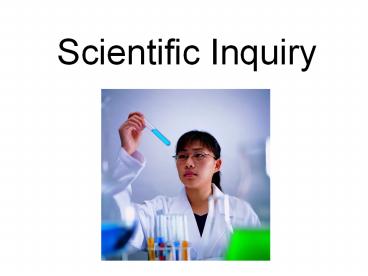Scientific Inquiry - PowerPoint PPT Presentation
1 / 20
Title:
Scientific Inquiry
Description:
Scientific Inquiry Scientists are CURIOUS they ask questions that make them want to investigate. OBSERVANT they look at the world around them CREATIVE ... – PowerPoint PPT presentation
Number of Views:240
Avg rating:3.0/5.0
Title: Scientific Inquiry
1
Scientific Inquiry
2
Scientists are
- CURIOUS they ask questions that make them want
to investigate. - OBSERVANT they look at the world around them
- CREATIVE they think about what they already
know to explain their observations and come up
with plans to test their ideas - SKEPTICAL they question their own conclusions
and except only explanations based on evidence
3
- Science is the continuous process of asking
questions and seeking answers!
4
Scientific Inquiry
- The process that allows us to think about and
design an experiment to help us find the answers
to our questions!
5
Scientific Inquiry
- Problem
- Hypothesis
- Experiment
- Materials - Variables/Controls
- Procedure - Observations
- Results
- Charts/Graphs
- Conclusion
- Limitations
6
Problem
- Identify by asking a question
- Only part of the process that will end with a
question mark. - As you do research/perform the experiment you
make ask more questions!
7
Our example
- Which brand of paper towels is the most
absorbent?
8
Hypothesis
Thinkers
- Tentative explanation
- Educated guess/prediction
- What do you think will happen
- when you perform your experiment?
- Written in the form of an IF/THEN statement.
- IF three brands of paper towels are tested, THEN
Bounty will be the most absorbent.
9
Experiment
- An organized procedure used to study something
under controlled conditions. - Consists of two parts
- Materials
- Procedure
10
- Materials items needed to
- perform the experiment
- Graduated cylinder, beaker, lab sheet, pencil,
paper towels, triple beam balance, water - Procedure sequence of actions or instructions
to be followed - The STEPS of the experiment!
1. 2. 3. 4. 5.
11
Variables
- Independent Variable (IV)
- the factor being tested
- paper towels
- Dependent Variable (DV)
- the factor being measured
- amount of water the paper towels absorb
y axis
DV
x axis
IV
12
Constants
- Factors that remain the same throughout the
experiment - Examples
- The size of the paper towel
- The type of liquid used
- Using same balance to mass wet towels
- OTHERS?
13
Control
- Serves as a basis for comparison
- Ex a paper towel that is not wet
14
Trials
- The number of time the IVs are tested
- The more the better!
Not this kind!
15
Observations
- Made during the course of an experiment using
your senses or equipment - Often recorded in data tables
- Examples
- Temperatures
- Times
- Color changes
16
Data
- One type of observation
- Evidence collected during a lab
TRIAL 1 2 3 4
TEMP
17
Results
- We often use charts and graphs to show our
results. - You may also write results statements that put
your observations/data into paragraph form.
18
Conclusion
- Statement indicating whether your hypothesis was
correct or incorrect. - Use one of the following in your conclusion
- Supported
- Rejected
- Could neither support nor reject
- Example
- The results of my experiment rejected my
hypothesis go on to tell why.
19
Limitations
- Unforeseen problems with an experiments design
- What went wrong during the lab.
- Examples
- Complete more trials
- Test more paper towel brands
- We spilt something beside water on the towels
- Used the wrong mass
- Forgot to test one brand
20
Click the link
http//www.youtube.com/watch?vKZaCy5Z87FAappdes
ktop































